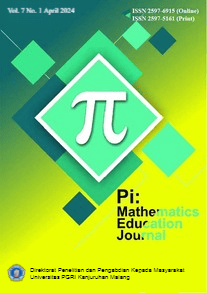Penerapan Model Problem Based Learning Untuk Meningkatkan Hasil Belajar Matematika Siswa
Main Article Content
Abstract
This research was conducted to improve the learning outcomes of class VIII SMP S Beer Seba Pekanbaru students by utilizing the problem based learning (PBL) model. This research uses a classroom action research strategy based on Kemmis and Mc Taggart. There are two cycles and each cycles has 4 distinct phases in conducting this research: preparation, implementation, observation, and analysis. A total of seventeen eighth grade students (11 boys and 6 girls) from Beer Seba Middle School in Pekanbaru participated in this research. This research data was collected using test sheets given at the end of the cycle and teacher and student observation sheets given at the beginning of each session. Analyzing student learning outcome data and teacher and student activity data is the data analysis technique used. Analysis of research data shows that the learning process and mathematics learning outcomes have increased between the periods before and after the action. This can be seen from the increase in student completion rates and the increasingly aligned teacher and student activities with the plan for each session. In cycle I, 41.17% of students obtained basic KKM scores; in cycle II this figure increased to 64.7%; and in cycle III it increased again to 82.3%.
Downloads
Article Details

This work is licensed under a Creative Commons Attribution 4.0 International License.
Pi: Mathematics Education Journal allows readers to read, download, copy, distribute, print, search, or link to the full texts of its articles and allow readers to use them for any other lawful purpose.

This work is licensed under a Creative Commons Attribution 4.0 International License. The Authors submitting a manuscript do so with the understanding that if accepted for publication, copyright of the article shall be assigned to Pi: Mathematics Education Journal
References
Andriani, W., Subandowo, M., Karyono, H., & Gunawan, W. (2021, August). Learning loss dalam pembelajaran daring di masa pandemi corona. In Seminar Nasional Teknologi Pembelajaran (Vol. 1, No. 1, pp. 484-501).
Banawi, A. (2019). Implementasi pendekatan saintifik pada sintak discovery/inquiry learning, based learning, project based learning. BIOSEL (Biology Science and Education): Jurnal Penelitian Science dan Pendidikan, 8(1), 90-100.
Darma, S. I., Syofni, S., & Suanto, E. (2022). Penerapan Model Problem Based Learning (PBL) Untuk Meningkatkan Hasil Belajar Matematika Siswa Kelas VIIB SMP IT Darul Huda Ukui. JURING (Journal for Research in Mathematics Learning), 5(1), 069-078.
Djonomiarjo, T. (2020). Pengaruh model problem based learning terhadap hasil belajar. Aksara: Jurnal Ilmu Pendidikan Nonformal, 5(1), 39-46.
Isrok'atun ; Amelia Rosmala.Model-model Pembelajaran Matematika / Isrok'atun, Amelia Rosmala; Editor : Bunga Sari Fatmawati .2019.
Itsni Putri, R. (2022). Pengaruh Model Pembelajaran Blended Learning Terhadap Motivasi dan Hasil Belajar Matematika Siswa Kelas X SMA Sultan Agung Kasiyan Timur (Doctoral dissertation, UIN Kiai Haji Achmad Shiddiq Jember).
Kuswari, R. I. (2020). Pengembangan LKS berbasis higher order thinking skill (Hots) dalam meningkatkan hasil belajar matematika kelas IV di MIN 3 Tulungagung dan SDI Qurrota A’yun Ngunut Tulungagung (Doctoral dissertation, IAIN Tulungagung).
Nada, F. M. (2020). Pengaruh Metode Learning Start With A Question (LSQ) Terhadap Motivasi Dan Hasil Belajar Matematika Siswa Kelas VIII Pada Materi Statistika Di SMP Muallimin Wonodadi Blitar.
Prasedari, L. P. E., Pudjawan, K., & Suranata, K. (2019). Pengaruh Model Pembelajaran Problem Based Learning Berorientasi Tri Pramana Terhadap Hasil Belajar Matematika Siswa Kelas IV. INOPENDAS: Jurnal Ilmiah Kependidikan, 2(2)
Purnamasari, M., Isman, J., Damayanti, A., & Ismah, I. (2017). Upaya Meningkatkan Hasil Belajar Matematika Terhadap Konsep Bangun Ruang materi luas dan volume balok dan kubus menggunakan metode drill sekolah smp islam al-ghazali kelas viii. FIBONACCI: Jurnal Pendidikan Matematika dan Matematika, 3(1), 45-52.
Ramadhan, I., Manisah, A., Angraini, D. A., Maulida, D., Sana, S., & Hafiza, N. (2022). Proses Perubahan Pembelajaran Siswa dari Daring ke Luring pada Saat Pandemi Covid-19 di Madrasah Tsanawiyah. EDUKATIF: Jurnal Ilmu Pendidikan, 4(2), 1783-1792.
Shoimin, A. (2017). 68 Model Pembelajaran Inovatif dalam Kurikulum 2013. Yogyakarta: Ar Ruzz Media.
Susilo, H., Chotimah, H., & Sari, Y. D. (2022). Penelitian Tindakan Kelas. Media Nusa Creative (MNC Publishing).

